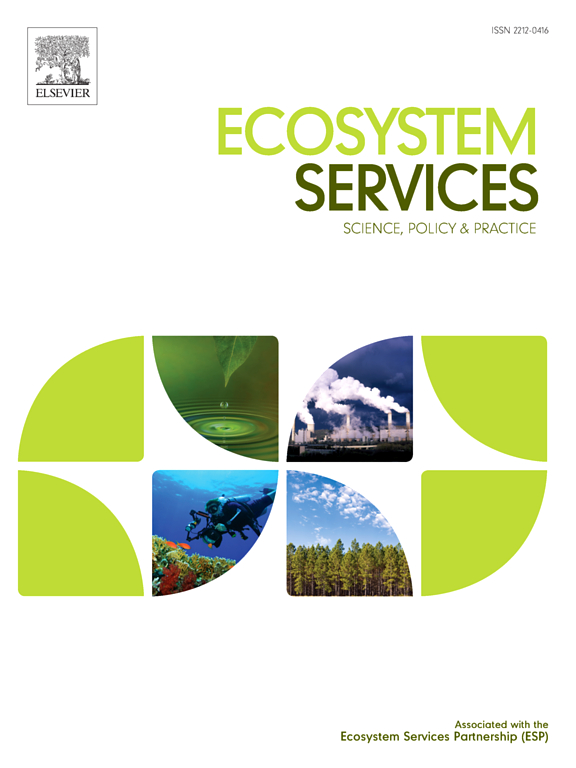Investing in forests Enhances ecosystem services and economic Growth in Cambodia: Evidence from the Integrated Economic-Environmental Modelling (IEEM) approach
IF 6.6
2区 环境科学与生态学
Q1 ECOLOGY
引用次数: 0
Abstract
Cambodia has one of the highest rates of deforestation in the world, which exacerbates local and global impacts of climate change while compromising the supply of critical ecosystem services that provide benefits to society. Cambodia’s Long-Term Strategy for Carbon Neutrality and its Nationally Determined Contributions aim to mitigate climate change and enhance ecosystem service supply contributing to reducing erosion and flood hazards that jeopardize human lives and infrastructure. In this paper, we investigate the economic, social and ecosystem service impacts of these two policy packages by applying the Integrated Economic-Environmental Model (IEEM) for Cambodia linked with spatial Land Use Land Cover change and Ecosystem Services modeling. Focusing on Forest and Other Land Use policies within the Long-Term Strategy and Nationally Determined Contributions, our results show that these policies would reduce cumulative carbon dioxide emissions by 1.6 billion tons by 2050. Cumulative Gross Domestic Product and wealth impacts would be US$3.576 billion and US$118 billion, respectively. Implementation of the policies would enhance regulating and provisioning ecosystem service flows overall by US$6.6 billion. The return on investment would be US$31 billion, though not valuing changes in natural capital and environmental quality would realize only about 12% of this return (US$3.7 billion). Our study demonstrates that working towards carbon neutrality is not only compatible with socioeconomic development but would effectively catalyze it. Further, we demonstrate that the most efficient and cost-effective strategy to meet Cambodia’s emissions targets would be to eliminate deforestation more rapidly than outlined in the Long-Term Strategy, complemented by proactive measures for afforestation and forest restoration. The evidence presented in this study may be used to build the business case for government and private sector investment in achieving Cambodia’s carbon neutrality goal by engaging Forest and Other Land Use sectors.
投资森林可增强柬埔寨的生态系统服务和经济增长:综合经济环境模型 (IEEM) 方法提供的证据
柬埔寨是世界上森林砍伐率最高的国家之一,这加剧了气候变化对当地和全球的影响,同时损害了为社会提供利益的关键生态系统服务的供应。柬埔寨的碳中和长期战略及其国家自主贡献旨在减缓气候变化,增加生态系统服务供应,有助于减少危及人类生命和基础设施的侵蚀和洪水灾害。在本文中,我们通过将柬埔寨的综合经济环境模型(IEEM)与空间土地利用、土地覆盖变化和生态系统服务模型相结合,研究了这两套政策对经济、社会和生态系统服务的影响。以长期战略和国家自主贡献中的森林和其他土地利用政策为重点,我们的研究结果表明,到2050年,这些政策将使累计二氧化碳排放量减少16亿吨。累计国内生产总值和财富影响将分别为35.76亿美元和1180亿美元。这些政策的实施将使生态系统服务流量的管理和供应总体上增加66亿美元。投资回报将达到310亿美元,但如果不考虑自然资本和环境质量的变化,只会实现其中约12%的回报(37亿美元)。我们的研究表明,努力实现碳中和不仅与社会经济发展相适应,而且可以有效地促进社会经济发展。此外,我们证明,实现柬埔寨排放目标的最有效和最具成本效益的战略是比长期战略中概述的更快地消除森林砍伐,并辅之以积极主动的植树造林和森林恢复措施。本研究提供的证据可用于建立政府和私营部门投资的商业案例,通过参与森林和其他土地利用部门来实现柬埔寨的碳中和目标。
本文章由计算机程序翻译,如有差异,请以英文原文为准。
求助全文
约1分钟内获得全文
求助全文
来源期刊

Ecosystem Services
ECOLOGYENVIRONMENTAL SCIENCES&-ENVIRONMENTAL SCIENCES
CiteScore
14.90
自引率
7.90%
发文量
109
期刊介绍:
Ecosystem Services is an international, interdisciplinary journal that is associated with the Ecosystem Services Partnership (ESP). The journal is dedicated to exploring the science, policy, and practice related to ecosystem services, which are the various ways in which ecosystems contribute to human well-being, both directly and indirectly.
Ecosystem Services contributes to the broader goal of ensuring that the benefits of ecosystems are recognized, valued, and sustainably managed for the well-being of current and future generations. The journal serves as a platform for scholars, practitioners, policymakers, and other stakeholders to share their findings and insights, fostering collaboration and innovation in the field of ecosystem services.
 求助内容:
求助内容: 应助结果提醒方式:
应助结果提醒方式:


